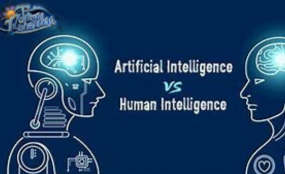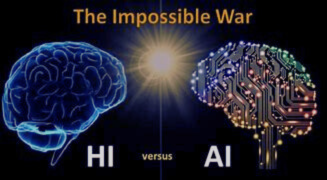
As of late, the quick progression of man-made consciousness (simulated intelligence) has turned into an interesting issue across businesses, starting both fervor and concern. As artificial intelligence proceeds to develop and turn out to be more incorporated into different parts of our lives, a consuming inquiry arises: *Can simulated intelligence really rival human insight and capabilities?* This blog entry dives into the present status of man-made intelligence, its capability to supplant or supplement human jobs, and what the future could hold for this opposition.
The Present Status of Computer-Based Intelligence: Intelligence Versus People

Computer based intelligence has taken astounding steps as of late, because of headways in AI, normal language handling, and mechanical technology. These innovations empower artificial intelligence frameworks to perform assignments that were once remembered to be solely inside the human space. For example, simulated intelligence controlled chatbots can now deal with client support requests, and refined calculations can examine huge measures of information to recognize patterns and make expectations.
In the clinical field, computer based intelligence helps with diagnosing sicknesses with high exactness, some of the time beating human specialists in unambiguous demonstrative assignments. In finance, simulated intelligence calculations oversee venture portfolios, execute exchanges, and evaluate gambles. In coordinated operations, computer based intelligence upgrades supply chains, foreseeing request and overseeing stock.
In any case, regardless of these noteworthy progressions, man-made intelligence actually has its constraints. While it succeeds at errands including design acknowledgment, information handling, and computerization, artificial intelligence battles with regions requiring imaginative reasoning, the capacity to understand people on a deeper level, and complex independent direction — spaces where people keep on holding a critical advantage.
The Case for computer based intelligence

1. Efficiency and Accuracy:
One of the main benefits of computer based intelligence is its capacity to handle data at rates and precision levels a long ways past human capacities. This makes it priceless in fields like medical care, money, and planned operations, where accuracy and speed are pivotal. For instance, simulated intelligence can dissect clinical pictures in short order, distinguishing irregularities that could take a human specialist significantly longer to identify.
2. Automation of Dreary Tasks:
computer based intelligence’s capacity to robotize unremarkable and redundant undertakings is changing businesses. In assembling, robots fueled by computer based intelligence can gather items with negligible human mediation, altogether diminishing work costs. In client care, simulated intelligence chatbots handle routine requests, permitting human specialists to zero in on more perplexing and nuanced client issues. This shift increments efficiency as well as upgrades work fulfillment by liberating people from tedious undertakings.
3. Data-Driven Insights:
artificial intelligence calculations can filter through gigantic datasets to reveal bits of knowledge that could evade human examiners. In showcasing, for example, artificial intelligence can break down customer conduct to make customized encounters and designated promoting efforts. In finance, simulated intelligence driven examination give financial backers experiences into market patterns, assisting them with pursuing informed choices.
The Case for People:

1. Creativity and Innovation:
One of the most particular human characteristics is the capacity to inventively think. While simulated intelligence can advance existing cycles, it battles with producing completely groundbreaking thoughts or arrangements. Human imagination is basic in fields like expressions, plan, and examination, where development drives progress.
2. Emotional Intelligence:
Human collaborations frequently include complex close to home subtleties that simulated intelligence can’t completely comprehend or repeat. Callings requiring compassion and profound responsiveness, like advising, nursing, and educating, are probably going to remain overwhelmingly human. The capacity to understand individuals on a profound level likewise assumes a vital part in authority and the executives, where understanding and spurring individuals are critical to progress.
3. Ethical Choice Making:
People have a moral and moral system that guides direction, something that man-made intelligence needs. In fields like regulation and medication, where choices can have critical moral ramifications, human judgment is essential. For instance, in medical care, specialists should consider the moral implications of life-saving therapies, adjusting possible advantages and damages.
The Fate of Work: Joint effort or Contest?

The discussion about whether artificial intelligence will supplant people in the labor force frequently inclines towards a more nuanced reality: cooperation. Rather than review simulated intelligence as a contender, numerous specialists see it as an instrument that can expand human capacities. The fate of work may not be a lose situation but instead a cooperative exertion where simulated intelligence handles information driven, tedious errands, and people center around inventiveness, sympathy, and moral navigation.
In areas like medical services, simulated intelligence can help specialists by giving demonstrative experiences and proposing therapy choices, permitting specialists to zero in on quiet consideration and complex cases. In imaginative businesses, computer based intelligence can act as a device to upgrade human imagination, offering better approaches to investigate creative articulation. In business, computer based intelligence can examine market patterns and client information, empowering human pioneers to go with additional educated key choices.
In addition, the combination of computer based intelligence into the labor force could prompt the formation of new position classifications. As man-made intelligence assumes control over specific undertakings, there will be a developing interest for experts who can create, make due, and keep up with simulated intelligence frameworks. This shift will require another arrangement of abilities, underlining the significance of schooling and preparing in setting up the labor force for what’s in store.
Moral Contemplations and Difficulties:

As simulated intelligence turns out to be more coordinated into our lives, it raises critical moral contemplations and difficulties. The potential for predisposition in simulated intelligence calculations is a main issue. Man-made intelligence frameworks gain from verifiable information, and assuming that information contains inclinations, the computer based intelligence can sustain and try and worsen those predispositions. For instance, in recruiting processes, man-made intelligence calculations prepared on one-sided authentic information could coincidentally lean toward specific gatherings over others, prompting separation.
Security is another basic issue. The utilization of simulated intelligence in information assortment and examination can encroach on people’s protection, particularly with regards to delicate data. Guaranteeing that simulated intelligence frameworks are straightforward, fair, and responsible is fundamental to tending to these moral worries.
finally The opposition among man-made intelligence and people is a complex and developing dynamic. While artificial intelligence offers unrivaled effectiveness, exactness, and information handling abilities, people bring remarkable characteristics like innovativeness, the capacity to appreciate anyone on a profound level, and moral thinking. As we push ahead, the key will track down ways of utilizing the qualities of both simulated intelligence and people to make a more useful, inventive, and impartial society.
The future may not be about man-made intelligence versus people but instead about computer based intelligence and people cooperating to accomplish more prominent levels. This cooperation won’t just rethink the labor force yet in addition open up additional opportunities for advancement and progress. As we embrace this future, it’s vital to explore the difficulties and open doors insightfully, guaranteeing that the advantages of computer based intelligence are shared extensively across society.